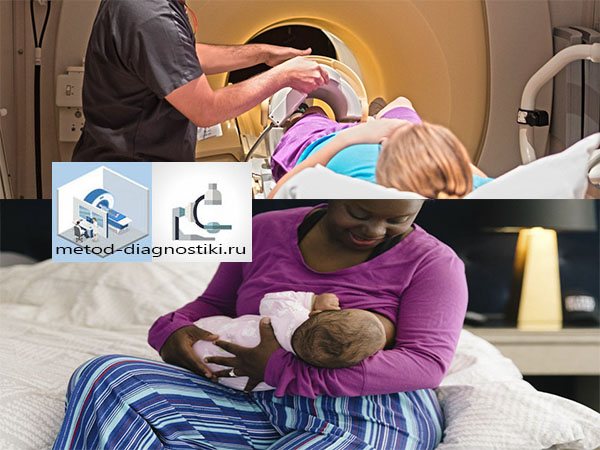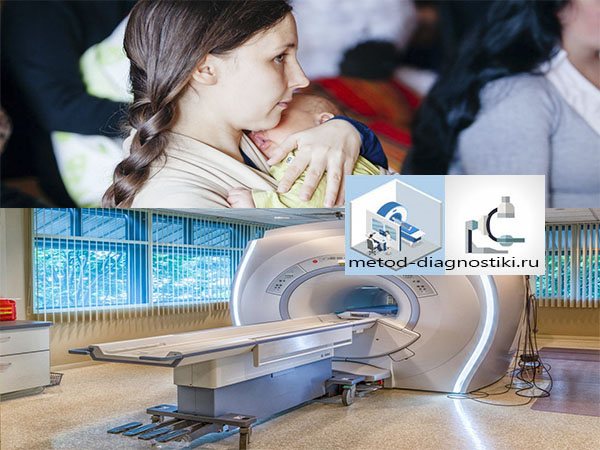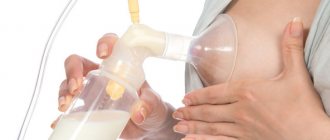What is magnetic tomography?
MRI is a fairly common method of examination, which provides the maximum amount of information about the organ being diagnosed. Scanning is carried out on a machine where magnetic scanners are located around the perimeter. When a patient is placed in a tomograph, the scanners begin to emit electromagnetic waves, creating a magnetic field inside the device, under its influence the hydrogen atoms that are part of the body begin to move at a certain angle. By tracking the trajectory of the particles, the computer records the indicators and as a result, the diagnostician receives a three-dimensional image of the required organ on the monitor.
Despite the fact that the examination involves a magnetic field, the procedure is recognized as safe in terms of exposure to radiation and does not have background radiation, since the magnitude of the radiation from the magnets is no more than that when talking on a mobile phone. Is it possible to do an MRI during lactation - definitely yes!
MRI and lactation period
Before computer diagnostics came into widespread use, numerous studies were conducted on the effects of magnetic fields on humans under various circumstances. They showed that diagnostics using a tomograph is absolutely safe. But there is no accurate data on the effects of magnetic radiation on the body from MRI during breastfeeding.
There is no evidence that this is dangerous or harmful, however, the period of development of the baby and feeding the newborn with breast milk is a unique process in which the baby receives all the necessary substances for growth and development. Consequently, a woman who is breastfeeding and exposed to magnetic radiation can transfer a certain dose of it through her milk to her children. The child’s small body is too vulnerable and unprotected to be exposed to such danger, therefore, if magnetic resonance imaging can be postponed, you need to take advantage of it.
But there are situations when a young mother with breastfeeding needs urgent diagnostics of the body, in this case the decision to conduct an MRI during breastfeeding is made by the attending physician.
Is it dangerous to perform an MRI during breastfeeding?
The study takes place while the patient is in an electromagnetic field. But there is no need to be afraid of this radiation, because it is created by many devices in our daily lives. We are in a field of varying intensity, using microwaves, mobile communication devices, televisions, driving electric vehicles, living near power lines.
Despite this obviousness, many women still wonder whether to do an MRI during breastfeeding or choose another study. But ultrasound is less informative, and computed tomography and fluorography are also associated with x-ray radiation, which is dangerous to humans in large doses. Therefore, they are not recommended to be done often.
Doctors consider magnetic resonance imaging safe for human health. Therefore, it is prescribed to women during lactation without fear that radiation will affect the milk. Breastfeeding is not even a relative contraindication for tomography; the procedure does not in any way affect the quality or quantity of milk. An additional argument in favor of safety can be the fact that MRI is allowed even for pregnant women, starting from the second trimester.
The infant himself can undergo this examination if his body is kept still during the procedure. This is difficult to implement in practice, so doctors prescribe other types of diagnostics for young children.
Doctors say: after the study, a nursing mother does not need to replace any feedings, and there is no need to express milk from the breast. As happens in the case of x-rays, for example.
Indications for tomography during lactation
If a woman has serious health problems, then breastfeeding will not be a contraindication for MRI, since this is the only sure way to identify lesions in the body. Tomography is carried out even during menstruation, when the doctor has suspicions:
- on developing neoplasms in the mammary glands;
- benign and malignant tumors in the breast;
- the presence of pathologies of the pituitary gland;
- brain tumors;
- breast implant rejection;
- diseases of the inner ear, sudden deterioration of hearing;
- severe loss of vision, malfunction of the visual apparatus;
- damage to the body's vascular system;
- disturbances in the functioning of the nervous system;
- developmental anomalies of the spinal column.
When diagnosing oncology using MRI of the brain in a pregnant or lactating woman, lesions and metastasis are detected.
In a medical institution, a nursing mother is ready to offer an individual magnetic scanning technique, which will definitely not cause harm to the baby due to the milk received from the mother. Accordingly, there is no need for pumping and MRI during breastfeeding can be performed without prior preparation.
If it is necessary to examine the mammary glands directly, or a scan using a contrast agent is prescribed, the doctor will suggest a tomography for nursing women with the condition that the mother refuses to breastfeed for 2-3 days after the diagnosis. MRI during breastfeeding is possible, but each case is considered individually in a special order, depending on the age of the woman, the machine where the examination will be carried out, and the symptoms with which the patient presented.
To feed or not to feed?
Many pediatricians who have observed the effects of contrast agents on the child's body, in particular such world-renowned doctors as Thomas Hale and Jack Newman, believe that there is no need to interrupt breastfeeding due to MRI with the use of contrast agents.
In their opinion, the percentage of active substances in milk is so small that it cannot affect the child’s health even if the mother breastfeeds him shortly after the study.
Manufacturers, by introducing a 24-hour limit, are trying to avoid responsibility for the possible risk associated with the baby’s individual reaction to contrast residues in the milk. At the same time, additional evidence of the harmlessness of breastfeeding after diagnosis with contrast is the fact that in some cases, when examining very young children using MRI, they may also be prescribed the use of contrast, and in much larger doses than they could receive with breast milk . However, even such doses do not threaten the child’s health.
Summarizing all of the above, we can conclude that the decision on whether to breastfeed the baby after a study using contrast agents is made by the nursing woman after consultation with the pediatrician observing the child.
If the baby is completely healthy, then you probably won’t need extra reinsurance. And you won’t need to stop breastfeeding, disrupt your diet, or teach your child to use a bottle.
If the baby is prone to allergic reactions or intestinal problems, the doctor may recommend stocking up on additional portions of breast milk before the diagnosis.
In this case, the woman will definitely need to express her breasts several times in order to remove from it the milk into which traces of the contrast agent have penetrated. Of course, you cannot give such expressed milk to your baby.
Read also:
Why is oxytocin injected after childbirth?
Contraindications for magnetic tomography during breastfeeding
Among all types of diagnostics during lactation, magnetic resonance scanning is preferred because it does not carry radiation load on the mother’s body and does not expose it to negative effects. However, computer diagnostics MRI during breastfeeding has certain contraindications:
- the presence of metal objects in a woman’s body - implants, pins, clamps, clips, prostheses, with the exception of titanium alloys;
- the presence in the body of life support devices for ventilation, an artificial kidney, an insulin pump;
- presence of electronic mechanisms, stimulators, defibrillator, hearing aid;
- chronic diseases in the acute stage;
- inability to hold oneself for some time without moving (convulsive syndromes, epilepsy);
- claustrophobia;
- When prescribing magnetic resonance imaging with the use of a contrast agent, an allergic reaction and individual intolerance to the contrast components will be a contraindication.

If an MRI with contrast is prescribed, then you first need to check the condition of the patient’s urinary system
In order for a woman with an implant to be allowed to undergo an MRI of the cervix or ovaries, she must obtain a certificate from the institution where the operation to insert the object into the body was performed. It must indicate the composition of the installed prosthesis, that is, what metals it is made of.
Before performing computer MRI diagnostics during breastfeeding, it is important to know the state of the nursing mother’s urinary system; it is dangerous to perform the procedure if its functions have not been impaired.
The effect of drugs on the baby
In some types of MRI examinations carried out during breastfeeding, a contrast agent is used - it helps the specialist to identify which tissues of the brain, digestive and pelvic organs are healthy, and which are developing a pathological process. The contrast is a drug that is administered intravenously to the patient. It is logical that such a procedure frightens young mothers whose children are breastfed.
Iodine-containing substances
Contrast agents used for MRI most often contain concentrated iodine, the use of which is not allowed during lactation. However, one should take into account the fact that the number of free molecules is negligible, so there are no risks.
MRI with contrast
Is it possible to do an MRI with contrast while breastfeeding? Experts answer this question in the affirmative. The dose of contrast agent entering the milk is so small that it does not pose a threat at all. You can feed your baby immediately after the procedure. Some women express milk first.
How is diagnosis carried out?
It is important that a nursing mother choose a clinic for examination that has the most modern medical equipment used for magnetic scanning. For MRI during breastfeeding, it is best if it is a vertical tomograph or an open type device. It is also important which doctor will conduct the examination. It is necessary that this is a competent and qualified doctor.
A woman arrives at a medical facility, leaves all metal objects in front of the tomography room, including jewelry, keys and watches, and puts her phone and any electronic devices and gadgets in a storage box. This is done for safety reasons, since the listed items can negatively affect the operation of the tomograph, which will affect the correctness of the data transmitted by the device. But what may be even more unpleasant is that the metal will begin to heat up under the influence of a magnetic field, and the patient may receive not only a burn, but also an injury, and the planned procedure will not take place.
In the diagnostic room, a woman sits in a tomograph depending on its type, chooses a comfortable position, turns on the device and the scanners begin their work.
It is important to remain still during the entire MRI procedure while breastfeeding. The scanning time takes from 30 to 70 minutes. At this time, the office has a pleasant comfortable temperature, fresh air is supplied, and pleasant music can be turned on if desired. Communication with the diagnostician is always enabled. The patient has a special sensor in her hand, by squeezing it she can tell the doctor that the procedure should be suspended, or that the patient’s health has worsened.

A diet before an MRI is not needed, except in cases of examination of abdominal organs
After the magnetic resonance imaging is completed, the doctor processes the results and interprets the resulting images. Most often, after a couple of hours, the completed data is given to the patient, and she must go with it to the attending physician. A diagnostician cannot make diagnoses or point out any pathologies; this is the competence of the doctor and specialist. He will also give specific recommendations on how to behave after diagnosing the body. But there are no side effects from MRI while breastfeeding.











